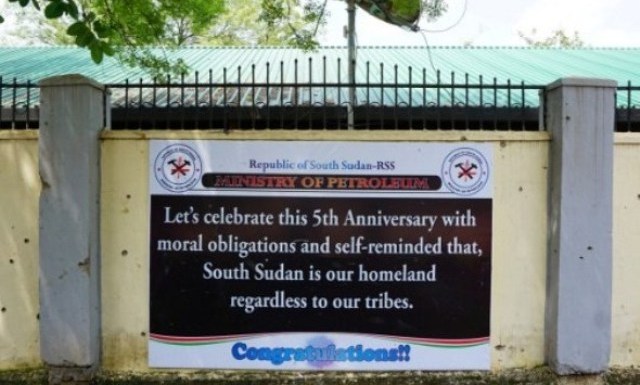South Sudanese rival spokespersons express disagreement over recent violence

July 18, 2016 (JUBA) – Two rival spokespersons belonging to President Salva Kiir and First Vice President, Riek Machar, blamed each side for the recent upsurge of violence and could not also agree on the proposed deployment of a third force in Juba.
Ateny Wek Ateny, President Kiir’s spokesperson and James Gatdet Dak, First Vice President Machar’s spokesman, could not agree whether it was necessary to deploy a third force from the region to help restore peace and security to the capital, Juba, after fighting erupted at J1 palace on 8 July.
“We don’t want a third force,” said Ateny, during a 40-minute debate with his rival, Dak, on Aljazeera English TV Stream program on Monday night.
Meanwhile Dak said there was need to deploy a third force under the mandate of the current United Nations Mission in South Sudan (UNMISS), saying President Kiir had failed in his leadership or to control his forces, which he blamed for triggering the fighting in Juba.
Ateny however said the fighting at J1 was started by Machar’s bodyguards who accompanied him with 20 military trucks full of soldiers and then tried to “take the government by force.”
When asked whether it was possible to remove the two leaders from the political leadership in South Sudan and bring another neutral person to take charge of the country, Ateny said President Kiir should be given another five years term in office so that he could now focus on development and services delivery in the country.
He accused Riek Machar of being a problem to President Kiir, making it difficult for the president to focus on the development of the young nation.
On the other hand, Dak said President Kiir is a “failed leader” who has squandered his chance in office, but added the two should implement the peace agreement.
Dak argued that the difference between the two leaders emerged seriously when Machar in 2013 tried to advise President Kiir to resolve about six issues which included “corruption and tribalism.”
He said “it would be unfair” to share blame and call for removal of the two leaders together. He likened it to “throwing away both good and bad apples just because they happen to be in the same basket.”
He argued that Machar is a visionary leader unlike President Kiir and should be given chance to lead, adding that there is nowhere to find “an angel” to lead South Sudan and that another third person besides Machar “maybe as bad as President Kiir.”
While Ateny blamed Machar for failure in the government between 2005 and 2011 when President Kiir was the First Vice President of the Sudan before the split and Machar was his deputy in the then Government of Southern Sudan (GoSS), Dak dismissed the accusation, saying President Kiir was the head of the southern government and was responsible for “appointing corrupt people” to essential government institutions without consultations with Machar.
Dak also accused President Kiir of making many of his current bad decisions based on the advices given to him by a tribal organization, called the Jieng [Dinka] Council of Elders (JCE), which membership he said is composed of ethnic Dinka intellectuals and prominent government officials.
Ateny denied the accusation and said the Dinka tribal council had never advised President Kiir, and instead accused Machar of tribalism, saying 90% of members of his current army of the SPLA-IO are from the Nuer ethnic group.
Dak also said the current crisis is to blame on President Kiir whom he said is not committed to peace and wants to dismantle it in implementing his “reservations” he made during the signing of the August 2015 peace agreement.
The two sides however only agreed to one point, that the only option to restore peace to the country is to fully implement the peace agreement.
(ST)
